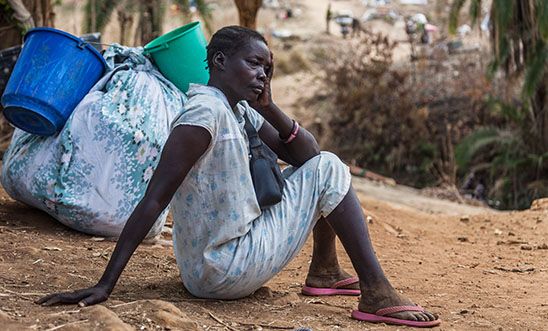
Report: Sexual violence in South Sudan

“The captain ordered the soldiers to choose any woman they felt like they wanted among us. Ten soldiers chose me… They took me inside a small room where then they decided to rape me. They pulled off my clothes and the 10 of them raped me, twice each… Some of them wanted to rape me using objects but others advised them ‘We shouldn’t do that, let us just use our penises’. They used both sides [vaginal and anal rape].”
Nyaguene* was returning to a protected campsite with a group of over 50 women when they ran into a gang of government soldiers.
She said their captain gave explicit orders that the women should be raped.
They are not the only ones. Not by a long shot.
A rising epidemic
Since the outbreak of violence in South Sudan’s capital city of Juba in December 2013 ethnic and political infighting has led to horrific sexual violence including rape, gang rape, sexual slavery, sexual mutilation, torture, castration, and forced nudity.
72% of women living in four civilian camps in Juba have reported being raped since the conflict broke out, mostly by police and soldiers, according to a 2015 survey by the United Nations Population Fund (UNFPA).
Here's a summary of what's happening in South Sudan.
Violence continues in South Sudan from Amnesty International on Vimeo.
Survivors say sexual violence is rampant, happening any time civilians come in contact with armed personnel. Whether during military attacks on villages, during searches of residential areas, along roads and at checkpoints, or following abduction or detention.
It seems almost nobody is safe. Women of all ages – including those who are pregnant – are all under threat. Many men have also fallen victim.
The level of sexual violence is shockingly widespread and brutal leaving victims with physical, psychological, and social damage for possibly decades to come. And as the violence continues things are only set to get worse. According to the South Sudan Protection Cluster, reports of sexual and gender-based violence increased by 61% between 2015 and 2016.
The perfect storm
There are many reasons why the situation has become this awful and why we’re a long way from seeing an improvement.
-
South Sudan’s law does not criminalise torture, crimes against humanity or genocide — so sexual violence can’t be prosecuted within South Sudan as any of these crimes.
-
Humanitarian facilities often aren’t easy to access and many survivors, particularly in rural areas, have nowhere to go for medical services.
-
Stigma around these crimes means victims are often further abused at home and are often too ashamed to seek medical care.
-
South Sudanese authorities have repeatedly failed to carry out decent investigations into crimes of sexual violence or to hold those responsible to account in fair trials, mainly due to lack of resources and unwillingness to address the issue.
What must be done
South Sudan’s government must address the social tensions in their society.
They must publicly acknowledge the sexual violence epidemic and make sure perpetrators are brought to justice and victims get the support they need.
Both the government and all opposition forces must issue clear orders prohibiting sexual violence, providing forces with appropriate training.
A vetting process of security forces should be introduced to make sure those known to commit sexually violent crimes are banned from service.
* All victims’ names have been changed to protect their privacy and safety
Read our full report and recommendations into tackling the sexual violence epidemic in South Sudan.